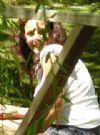|
ESL Forum:
Techniques and methods
in Language Teaching
Games, activities
and teaching ideas
Grammar and
Linguistics
Teaching material
Concerning
worksheets
Concerning
powerpoints
Concerning online
exercises
Make suggestions,
report errors
Ask for help
Message board
|
ESL forum >
Techniques and methods in Language Teaching > genre&grammar
genre&grammar
|

Rosangella

|
genre&grammar
|
|
Hi teachers,
Here in Brazil is starting a new methodology , it �s named genre, discursive genre. The teachers have to teach to students the differents kinds of discurse: recipes, letters,complaint letters, emails, messages, curriculum vitae, news, informative text, comics, HQ, dialogues, fairy tales,fable, comic strips and so on.
Each one has a particular caracteristic , the discursive aspects are different and the aim is show these differences to the students because they need learning several discursive genre, whereas here in esl site is commmon records of downloads of grammar ws. Then I would like to know how is the world teaching style. This is the reason I sent this question to some members from different countries. I would like other opinions. Can you comment about this, please?
Hugs,
Rosangella
|
11 Jul 2009
|
|
|
|

Carla Horne

|
Hi,
You can find all of that here, but it is not all going to be on the Recent Contributions page. In other words, you will have to search and use your points to get it. If you send me a pm, I can help you with ones that are for intermediate and advanced students, but please ask the other members as well.
Carla
|
11 Jul 2009
|
|
|

missveronica

|
I know advertising you own WS is frowned upon, so dont take this as advertising, plz! :)
I uploaded some time ago a WS on how to write a comparative commentary, you can find there some links that might help you find info. As well as a chart to compare/analyze txts from different points of view.
the comp comm is part of the IB program
As regards teaching how to analyze...well I find it quite hard, esp cause my stds are not used to doing it in their mother tongue. However, once they �ve done it enough its easier
Well, if you dont have points pm me and I �ll send you the WS "for free" LOL :D
|
11 Jul 2009
|
|
|

Thalia Gralik

|
|
Hello darling!!! Greetings from Curitiba!!
I hope I can help you, and please if you get some more U can send me too!!!
Darling I�ll try to send you the material I have already separetd for you!!!
Kisses,
Thalia |
11 Jul 2009
|
|
|

Nani Pappi

|
|
I believe the discursive genre begins with Vygostky and Bakthin. Try searching "An�lise critica do discurso" in google scholar and you may get some academic articles on the theme. I think this new approach is unknown to many of us. There is some bibliography that may be useful:
Butt, D., R. Fahey, S. Feez, S. Spinks & C. Yallop (2000): Using Functional Grammar: An Explorer�s Guide. 2nd Ed., Sidney:Butt,
D., R. Fahey, S. Feez, S. Spinks & C. Yallop (2000): UsingFunctional Grammar: An Explorer�s Guide. 2nd Ed., Sidney:NCETR-Macquarie University.
Fairclough, N. (2003): Analysing discourse: Textual Analysis for Social Research. London: Routledge.
Martin, J. R, & D. Rose (2007): Working with Discourse: Meaning beyond the Clause. London: Continuum, 2nd Rev Ed.
Wetherell, M., S. Taylor & S. J. Yates (2001): Discourse as data: A Guide for Analysis. London: Sage/The Open University.
Wetherell, M., S. Taylor & S. J. Yates (2001): Discourse Theory and Practice: A Reader. London: Sage/The Open University.
|
12 Jul 2009
|
|
|